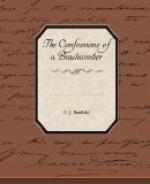On some of the islands where the tree is plentiful numbers of pigeons meet a dreary fate every season. The maturity of the seeds coincides with the hatching out of the young, and inexperienced birds pay dearly for their inexperience. The natural glutin is produced while the slim, fluted, inch-long seeds are green, but its virtue remains even after the whole panicle has withered and has fallen. So tenacious is it and prompt, that should a panicle as it whirls downward touch the leaves of lower branches of the parent, or of any neighbouring tree, it sticks and becomes a pendant swaying trap in a new position. At first glance it is not easy to identify the tree to which the obnoxious feature belongs.
The seeds occasion even dogs considerable distress, and might easily be the cause of death to them. As the dog endeavours to remove them from his feet and sides with his teeth, his muzzle is fouled, and he very soon exhibits confusion and alarm, and rolling about in frenzied attempts to free himself, gathers more and more of the seeds and accumulated rubbish.
One is led to ponder upon the purpose of this provision—to endeavour, if possible, to find its justification. Insects lured by the sweetness of the exudation are callously entrapped, and why so? Do the seeds require the presence of animal matter to ensure germination? In that case the tree is indirectly carnivorous, and therefore decidedly entitled to recognition among the curiosities of the island. Is the glutin secreted to secure the wide dispersal of the seeds? If so, the object is largely self-defeated, for seeds by the hundred cling as they fall to the branches of the parent tree, and to those of its lowly neighbours. Certainly some proportion of the seeds which reach the ground must be borne hither and thither by the agency of that eternal scratcher, the scrub fowl. But even a bird of such immensely proportionate strength may be seriously troubled by them. A case in point may be cited. A dog retrieving a scrub fowl, which had fallen in the vicinity of an “Ahm-moo” tree, emerged with it entirely enveloped with the seeds and adhering rubbish, and itself almost helpless from a similar cause. In this happy chance the seeds were eventually widely distributed. If the glutin is provided to prevent birds consuming the kernels, then the object is perfectly served; otherwise no very satisfactory reason is apparent why the tree should be invested with the means of destroying even humble forms of life. Is this one of the “lost chords” in the harmony of nature?




